By Sunil Kumar · Tuesday, July 3, 2012 As an occasional feature on TELOSscope, we highlight a past Telos article whose critical insights continue to illuminate our thinking and challenge our assumptions. Today, Sunil Kumar looks at Theodor W. Adorno’s “The Stars Down to Earth: The Los Angeles Times Astrology Column,” from Telos 19 (Spring 1974).
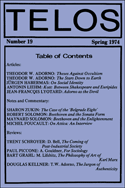 “The Stars Down to Earth” is the content analysis of an astrology column that Adorno wrote during a return visit to the United States from Germany in 1952–53 and appeared in translation in Telos in 1974. The column under scrutiny called, “Astrological Forecasts,” was written by Carroll Righter and appeared in the Los Angeles Times, described by Adorno as a conservative newspaper, leaning far to the right wing of the Republican Party. He engages in a detailed analysis of the column between November 1952 and February 1953. His method is that of the systematic construction of the imagined readers of the column and a critique of the ideology that the column reinforces, that of accepting the social system as fate. Adorno hypothesizes that columns such as these mold to some extent the reader’s thinking and foster an element of blind acceptance. The impetus of the piece, as in “The Thesis against Occultism” (1947), is to highlight the tendency toward irrationality and authoritarianism in mid-twentieth-century Western culture. In the analysis of the column, this irrationality is reflected by the readers’ acceptance of the column’s absurd claim to be inspired by the stars, and the need to look for guidance and succor in the advice of an expert authority on mundane matters. The stars stand in for the reader of the column as a source of authority, and the belief in astrology represents for him or her a belief in a higher order—one that also appears to present to events a veneer of rationality to its opaque origin. “The Stars Down to Earth” is the content analysis of an astrology column that Adorno wrote during a return visit to the United States from Germany in 1952–53 and appeared in translation in Telos in 1974. The column under scrutiny called, “Astrological Forecasts,” was written by Carroll Righter and appeared in the Los Angeles Times, described by Adorno as a conservative newspaper, leaning far to the right wing of the Republican Party. He engages in a detailed analysis of the column between November 1952 and February 1953. His method is that of the systematic construction of the imagined readers of the column and a critique of the ideology that the column reinforces, that of accepting the social system as fate. Adorno hypothesizes that columns such as these mold to some extent the reader’s thinking and foster an element of blind acceptance. The impetus of the piece, as in “The Thesis against Occultism” (1947), is to highlight the tendency toward irrationality and authoritarianism in mid-twentieth-century Western culture. In the analysis of the column, this irrationality is reflected by the readers’ acceptance of the column’s absurd claim to be inspired by the stars, and the need to look for guidance and succor in the advice of an expert authority on mundane matters. The stars stand in for the reader of the column as a source of authority, and the belief in astrology represents for him or her a belief in a higher order—one that also appears to present to events a veneer of rationality to its opaque origin.
Continue reading →
By Wesley Phillips · Tuesday, January 17, 2012 Wesley Phillips’s “Melancholy Science? German Idealism and Critical Theory Reconsidered” appears in Telos 157 (Winter 2011). Read the full version online at the TELOS Online website, or purchase a print copy of the issue here.
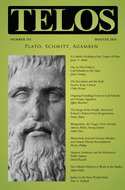 What is the relationship between theory and praxis today? During the 1960s, Adorno’s melancholy science was reproached with the charge of resignation, echoes of which have continued up to the present day—whether in Agamben or in praxis-oriented radical thought. In what is the most substantial critique to date, Gillian Rose initially sympathized with Adorno only to reject his neo-Kantian Marxism—the problem being that the melancholy science would involve a masochistically infinite task concerned with the recovery of an irretrievable utopia, leading to a methodological detachment from the social object. Understood in this way, the question of finite social praxis becomes an immanently philosophical matter. While following Rose’s orientation toward German idealism—for its imagined critique of neo-Kantianism and theory-ism—this article argues that, due to his unsatisfactory treatment of historical suffering, a return to Hegel alone (albeit after Marx) is insufficient. Rather, a dialectic of Hegel and his adversary Schelling suggests a distinctive account of determinate activity that avoids Melancholia without rejoicing the actuality of world spirit. This is made possible by way of an affinity between conceptions of melancholy and history in Schelling and Benjamin, from whom Adorno develops his traurige Wissenschaft. What is the relationship between theory and praxis today? During the 1960s, Adorno’s melancholy science was reproached with the charge of resignation, echoes of which have continued up to the present day—whether in Agamben or in praxis-oriented radical thought. In what is the most substantial critique to date, Gillian Rose initially sympathized with Adorno only to reject his neo-Kantian Marxism—the problem being that the melancholy science would involve a masochistically infinite task concerned with the recovery of an irretrievable utopia, leading to a methodological detachment from the social object. Understood in this way, the question of finite social praxis becomes an immanently philosophical matter. While following Rose’s orientation toward German idealism—for its imagined critique of neo-Kantianism and theory-ism—this article argues that, due to his unsatisfactory treatment of historical suffering, a return to Hegel alone (albeit after Marx) is insufficient. Rather, a dialectic of Hegel and his adversary Schelling suggests a distinctive account of determinate activity that avoids Melancholia without rejoicing the actuality of world spirit. This is made possible by way of an affinity between conceptions of melancholy and history in Schelling and Benjamin, from whom Adorno develops his traurige Wissenschaft.
Continue reading →
By Charles Kollmer · Monday, August 8, 2011 As an occasional feature on TELOSscope, we highlight a past Telos article whose critical insights continue to illuminate our thinking and challenge our assumptions. Today, Charles Kollmer looks at Nicholas Joll’s “How Should Philosophy Be Clear? Loaded Clarity, Default Clarity, and Adorno,” from Telos 146 (Spring 2009).
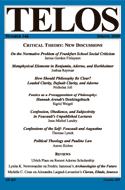 In an apropos piece of metaphilosophy entitled “How Should Philosophy Be Clear?” Nicholas Joll offers several insights on the concept of clarity in relation to philosophical texts. On initial inspection, Joll’s style seems to reveal a bias towards the Analytical tradition in philosophy: his argumentation is clearly organized, rigorous, and formulated in logical propositions. Yet his work also attains the savvy and self-awareness that renders metaphilosophy convincing, as demonstrated in his first proposition, which states that any notion of clarity will be partisan with regards to the Analytical-Continental divide. In spite of this partisanship, Joll champions a concept of “default clarity” and demonstrates its aptitude for judiciously evaluating argumentation. He shrewdly refuses to overdetermine the prescriptive force of default clarity. Far from an immutable law, default clarity offers broad guidelines with the caveat that “the justificatory burden lies with those who would eschew such clarity.” In an apropos piece of metaphilosophy entitled “How Should Philosophy Be Clear?” Nicholas Joll offers several insights on the concept of clarity in relation to philosophical texts. On initial inspection, Joll’s style seems to reveal a bias towards the Analytical tradition in philosophy: his argumentation is clearly organized, rigorous, and formulated in logical propositions. Yet his work also attains the savvy and self-awareness that renders metaphilosophy convincing, as demonstrated in his first proposition, which states that any notion of clarity will be partisan with regards to the Analytical-Continental divide. In spite of this partisanship, Joll champions a concept of “default clarity” and demonstrates its aptitude for judiciously evaluating argumentation. He shrewdly refuses to overdetermine the prescriptive force of default clarity. Far from an immutable law, default clarity offers broad guidelines with the caveat that “the justificatory burden lies with those who would eschew such clarity.”
Continue reading →
By Charles Kollmer · Tuesday, August 2, 2011 As an occasional feature on TELOSscope, we highlight a past Telos article whose critical insights continue to illuminate our thinking and challenge our assumptions. Today, Charles Kollmer looks at David Jenemann’s “Adorno Unplugged: The Ambivalence of the Machine Age,” from Telos 149 (Winter 2009).
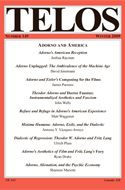 The work of Theodor W. Adorno is replete with paradox, and the abundant and irresolvable tensions in his writings reflect the disheartening milieu in which he wrote. Based on a cursory reading of “The Culture Industry: Enlightenment as Mass Deception,” from Adorno and Horkheimer’s Dialectic of Enlightenment, we might be left with the impression that Adorno wielded this rhetorical weapon in a uniform manner, indicating the ways in which the modern fruits of Enlightenment contradict the original ethos of Enlightenment thought. Indeed, these are difficult charges to refute, as modernity’s myriad episodes of mass violence render notions of teleological “progress” rather untenable. Poststructuralist thought exhibits a reverence for this innovation in thinking. According to Antoni Negri, “Adorno’s model of cultural criticism genuinely uncovered the ontology of the new world” (cited in Jenemann). Yet these same tracts always contain caveats, noting that, despite the paradox and contradiction inherent in modern infrastructure and society, modernity presents us with multitudinous opportunities for radically disrupting the stasis of the status quo. This is the “situation of those who are living through the passage from modernity to postmodernity,” writes Negri. Such caveats imply that Adorno’s critical theory fails to recognize these possibilities for change, at worst typecasting him as a grumpy Luddite. The work of Theodor W. Adorno is replete with paradox, and the abundant and irresolvable tensions in his writings reflect the disheartening milieu in which he wrote. Based on a cursory reading of “The Culture Industry: Enlightenment as Mass Deception,” from Adorno and Horkheimer’s Dialectic of Enlightenment, we might be left with the impression that Adorno wielded this rhetorical weapon in a uniform manner, indicating the ways in which the modern fruits of Enlightenment contradict the original ethos of Enlightenment thought. Indeed, these are difficult charges to refute, as modernity’s myriad episodes of mass violence render notions of teleological “progress” rather untenable. Poststructuralist thought exhibits a reverence for this innovation in thinking. According to Antoni Negri, “Adorno’s model of cultural criticism genuinely uncovered the ontology of the new world” (cited in Jenemann). Yet these same tracts always contain caveats, noting that, despite the paradox and contradiction inherent in modern infrastructure and society, modernity presents us with multitudinous opportunities for radically disrupting the stasis of the status quo. This is the “situation of those who are living through the passage from modernity to postmodernity,” writes Negri. Such caveats imply that Adorno’s critical theory fails to recognize these possibilities for change, at worst typecasting him as a grumpy Luddite.
Continue reading →
By Howard Eiland · Monday, July 25, 2011 Howard Eiland’s “Allegories of Falling” appears in Telos 155 (Summer 2011). Read the full version online at the Telos Online website, or purchase a print copy of the issue in our store.
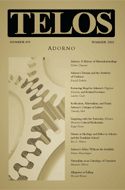 Although the story of the Fall of Man, as recounted in the biblical book of Genesis, has been a continual source of literature and thought, its meaning remains elusive. At issue in the story is the conception of self-consciousness, understood as a power of reflection on the immediacy of experience, a division in being (I am now “beside myself” in shame) that parodies the original division and articulation of things in the act of Creation. Adam and Eve awaken from their child-like absorption, awaken from and to their nakedness; they fall into the world and into history, as into adulthood. It is in the context of this mortal knowledge and emergent negotiation of distance that the ur-Christian problematic of the “now,” involving the distinction of chromos from kairos, manifests its paradoxical gravity, something obscured by linear eschatologies. The messianic awakening is not a simple restoration of immediacy, nor any solid “ground,” but readiness for the sudden transformation of chromos into kairos, an allegorizing of experience as the play of eternal transience. Among the many literary afterlives of the garden/world allegory, this article focuses on examples from the works of Shakespeare, Dickens, and Kafka. Although the story of the Fall of Man, as recounted in the biblical book of Genesis, has been a continual source of literature and thought, its meaning remains elusive. At issue in the story is the conception of self-consciousness, understood as a power of reflection on the immediacy of experience, a division in being (I am now “beside myself” in shame) that parodies the original division and articulation of things in the act of Creation. Adam and Eve awaken from their child-like absorption, awaken from and to their nakedness; they fall into the world and into history, as into adulthood. It is in the context of this mortal knowledge and emergent negotiation of distance that the ur-Christian problematic of the “now,” involving the distinction of chromos from kairos, manifests its paradoxical gravity, something obscured by linear eschatologies. The messianic awakening is not a simple restoration of immediacy, nor any solid “ground,” but readiness for the sudden transformation of chromos into kairos, an allegorizing of experience as the play of eternal transience. Among the many literary afterlives of the garden/world allegory, this article focuses on examples from the works of Shakespeare, Dickens, and Kafka.
Continue reading →
By Maurizio Meloni · Friday, July 22, 2011 Maurizio Meloni’s “Naturalism as an Ontology of Ourselves” appears in Telos 155 (Summer 2011). Read the full version online at the Telos Online website, or purchase a print copy of the issue in our store.
 Scientific naturalism, according to Jürgen Habermas, represents one of the “two countervailing trends that mark the intellectual tenor of our age,” the other being religious worldviews. Using Foucault’s distinction between philosophy as an “analytic of truth” and philosophy as an “ontology of the present” and “ontology of ourselves,” this essay addresses naturalism less as an epistemological issue than as a global way of rethinking humanness, that is as the theoretical “correlative” of certain local practices, which, under the influence of leading sciences such as neuroscience and molecular biology, contribute today to the naturalization of the human. In the second part of the essay, I will discuss three hermeneutic models through which leading Continental thinkers have reacted to this intertwinement of naturalism and the human condition in modernity: naturalism as a break, as a danger, and as a loss. From their reactions, the antinaturalistic legacy of much of Continental philosophy emerges clearly, and invites us to think of the present naturalistic epoch in a more radical way. Scientific naturalism, according to Jürgen Habermas, represents one of the “two countervailing trends that mark the intellectual tenor of our age,” the other being religious worldviews. Using Foucault’s distinction between philosophy as an “analytic of truth” and philosophy as an “ontology of the present” and “ontology of ourselves,” this essay addresses naturalism less as an epistemological issue than as a global way of rethinking humanness, that is as the theoretical “correlative” of certain local practices, which, under the influence of leading sciences such as neuroscience and molecular biology, contribute today to the naturalization of the human. In the second part of the essay, I will discuss three hermeneutic models through which leading Continental thinkers have reacted to this intertwinement of naturalism and the human condition in modernity: naturalism as a break, as a danger, and as a loss. From their reactions, the antinaturalistic legacy of much of Continental philosophy emerges clearly, and invites us to think of the present naturalistic epoch in a more radical way.
Continue reading →
|
|
 “The Stars Down to Earth” is the content analysis of an astrology column that Adorno wrote during a return visit to the United States from Germany in 1952–53 and appeared in translation in Telos in 1974. The column under scrutiny called, “Astrological Forecasts,” was written by Carroll Righter and appeared in the Los Angeles Times, described by Adorno as a conservative newspaper, leaning far to the right wing of the Republican Party. He engages in a detailed analysis of the column between November 1952 and February 1953. His method is that of the systematic construction of the imagined readers of the column and a critique of the ideology that the column reinforces, that of accepting the social system as fate. Adorno hypothesizes that columns such as these mold to some extent the reader’s thinking and foster an element of blind acceptance. The impetus of the piece, as in “The Thesis against Occultism” (1947), is to highlight the tendency toward irrationality and authoritarianism in mid-twentieth-century Western culture. In the analysis of the column, this irrationality is reflected by the readers’ acceptance of the column’s absurd claim to be inspired by the stars, and the need to look for guidance and succor in the advice of an expert authority on mundane matters. The stars stand in for the reader of the column as a source of authority, and the belief in astrology represents for him or her a belief in a higher order—one that also appears to present to events a veneer of rationality to its opaque origin.
“The Stars Down to Earth” is the content analysis of an astrology column that Adorno wrote during a return visit to the United States from Germany in 1952–53 and appeared in translation in Telos in 1974. The column under scrutiny called, “Astrological Forecasts,” was written by Carroll Righter and appeared in the Los Angeles Times, described by Adorno as a conservative newspaper, leaning far to the right wing of the Republican Party. He engages in a detailed analysis of the column between November 1952 and February 1953. His method is that of the systematic construction of the imagined readers of the column and a critique of the ideology that the column reinforces, that of accepting the social system as fate. Adorno hypothesizes that columns such as these mold to some extent the reader’s thinking and foster an element of blind acceptance. The impetus of the piece, as in “The Thesis against Occultism” (1947), is to highlight the tendency toward irrationality and authoritarianism in mid-twentieth-century Western culture. In the analysis of the column, this irrationality is reflected by the readers’ acceptance of the column’s absurd claim to be inspired by the stars, and the need to look for guidance and succor in the advice of an expert authority on mundane matters. The stars stand in for the reader of the column as a source of authority, and the belief in astrology represents for him or her a belief in a higher order—one that also appears to present to events a veneer of rationality to its opaque origin.  What is the relationship between theory and praxis today? During the 1960s, Adorno’s melancholy science was reproached with the charge of resignation, echoes of which have continued up to the present day—whether in Agamben or in praxis-oriented radical thought. In what is the most substantial critique to date, Gillian Rose initially sympathized with Adorno only to reject his neo-Kantian Marxism—the problem being that the melancholy science would involve a masochistically infinite task concerned with the recovery of an irretrievable utopia, leading to a methodological detachment from the social object. Understood in this way, the question of finite social praxis becomes an immanently philosophical matter. While following Rose’s orientation toward German idealism—for its imagined critique of neo-Kantianism and theory-ism—this article argues that, due to his unsatisfactory treatment of historical suffering, a return to Hegel alone (albeit after Marx) is insufficient. Rather, a dialectic of Hegel and his adversary Schelling suggests a distinctive account of determinate activity that avoids Melancholia without rejoicing the actuality of world spirit. This is made possible by way of an affinity between conceptions of melancholy and history in Schelling and Benjamin, from whom Adorno develops his traurige Wissenschaft.
What is the relationship between theory and praxis today? During the 1960s, Adorno’s melancholy science was reproached with the charge of resignation, echoes of which have continued up to the present day—whether in Agamben or in praxis-oriented radical thought. In what is the most substantial critique to date, Gillian Rose initially sympathized with Adorno only to reject his neo-Kantian Marxism—the problem being that the melancholy science would involve a masochistically infinite task concerned with the recovery of an irretrievable utopia, leading to a methodological detachment from the social object. Understood in this way, the question of finite social praxis becomes an immanently philosophical matter. While following Rose’s orientation toward German idealism—for its imagined critique of neo-Kantianism and theory-ism—this article argues that, due to his unsatisfactory treatment of historical suffering, a return to Hegel alone (albeit after Marx) is insufficient. Rather, a dialectic of Hegel and his adversary Schelling suggests a distinctive account of determinate activity that avoids Melancholia without rejoicing the actuality of world spirit. This is made possible by way of an affinity between conceptions of melancholy and history in Schelling and Benjamin, from whom Adorno develops his traurige Wissenschaft.  In an apropos piece of metaphilosophy entitled “How Should Philosophy Be Clear?” Nicholas Joll offers several insights on the concept of clarity in relation to philosophical texts. On initial inspection, Joll’s style seems to reveal a bias towards the Analytical tradition in philosophy: his argumentation is clearly organized, rigorous, and formulated in logical propositions. Yet his work also attains the savvy and self-awareness that renders metaphilosophy convincing, as demonstrated in his first proposition, which states that any notion of clarity will be partisan with regards to the Analytical-Continental divide. In spite of this partisanship, Joll champions a concept of “default clarity” and demonstrates its aptitude for judiciously evaluating argumentation. He shrewdly refuses to overdetermine the prescriptive force of default clarity. Far from an immutable law, default clarity offers broad guidelines with the caveat that “the justificatory burden lies with those who would eschew such clarity.”
In an apropos piece of metaphilosophy entitled “How Should Philosophy Be Clear?” Nicholas Joll offers several insights on the concept of clarity in relation to philosophical texts. On initial inspection, Joll’s style seems to reveal a bias towards the Analytical tradition in philosophy: his argumentation is clearly organized, rigorous, and formulated in logical propositions. Yet his work also attains the savvy and self-awareness that renders metaphilosophy convincing, as demonstrated in his first proposition, which states that any notion of clarity will be partisan with regards to the Analytical-Continental divide. In spite of this partisanship, Joll champions a concept of “default clarity” and demonstrates its aptitude for judiciously evaluating argumentation. He shrewdly refuses to overdetermine the prescriptive force of default clarity. Far from an immutable law, default clarity offers broad guidelines with the caveat that “the justificatory burden lies with those who would eschew such clarity.”  The work of Theodor W. Adorno is replete with paradox, and the abundant and irresolvable tensions in his writings reflect the disheartening milieu in which he wrote. Based on a cursory reading of “The Culture Industry: Enlightenment as Mass Deception,” from Adorno and Horkheimer’s Dialectic of Enlightenment, we might be left with the impression that Adorno wielded this rhetorical weapon in a uniform manner, indicating the ways in which the modern fruits of Enlightenment contradict the original ethos of Enlightenment thought. Indeed, these are difficult charges to refute, as modernity’s myriad episodes of mass violence render notions of teleological “progress” rather untenable. Poststructuralist thought exhibits a reverence for this innovation in thinking. According to Antoni Negri, “Adorno’s model of cultural criticism genuinely uncovered the ontology of the new world” (cited in Jenemann). Yet these same tracts always contain caveats, noting that, despite the paradox and contradiction inherent in modern infrastructure and society, modernity presents us with multitudinous opportunities for radically disrupting the stasis of the status quo. This is the “situation of those who are living through the passage from modernity to postmodernity,” writes Negri. Such caveats imply that Adorno’s critical theory fails to recognize these possibilities for change, at worst typecasting him as a grumpy Luddite.
The work of Theodor W. Adorno is replete with paradox, and the abundant and irresolvable tensions in his writings reflect the disheartening milieu in which he wrote. Based on a cursory reading of “The Culture Industry: Enlightenment as Mass Deception,” from Adorno and Horkheimer’s Dialectic of Enlightenment, we might be left with the impression that Adorno wielded this rhetorical weapon in a uniform manner, indicating the ways in which the modern fruits of Enlightenment contradict the original ethos of Enlightenment thought. Indeed, these are difficult charges to refute, as modernity’s myriad episodes of mass violence render notions of teleological “progress” rather untenable. Poststructuralist thought exhibits a reverence for this innovation in thinking. According to Antoni Negri, “Adorno’s model of cultural criticism genuinely uncovered the ontology of the new world” (cited in Jenemann). Yet these same tracts always contain caveats, noting that, despite the paradox and contradiction inherent in modern infrastructure and society, modernity presents us with multitudinous opportunities for radically disrupting the stasis of the status quo. This is the “situation of those who are living through the passage from modernity to postmodernity,” writes Negri. Such caveats imply that Adorno’s critical theory fails to recognize these possibilities for change, at worst typecasting him as a grumpy Luddite.  Although the story of the Fall of Man, as recounted in the biblical book of Genesis, has been a continual source of literature and thought, its meaning remains elusive. At issue in the story is the conception of self-consciousness, understood as a power of reflection on the immediacy of experience, a division in being (I am now “beside myself” in shame) that parodies the original division and articulation of things in the act of Creation. Adam and Eve awaken from their child-like absorption, awaken from and to their nakedness; they fall into the world and into history, as into adulthood. It is in the context of this mortal knowledge and emergent negotiation of distance that the ur-Christian problematic of the “now,” involving the distinction of chromos from kairos, manifests its paradoxical gravity, something obscured by linear eschatologies. The messianic awakening is not a simple restoration of immediacy, nor any solid “ground,” but readiness for the sudden transformation of chromos into kairos, an allegorizing of experience as the play of eternal transience. Among the many literary afterlives of the garden/world allegory, this article focuses on examples from the works of Shakespeare, Dickens, and Kafka.
Although the story of the Fall of Man, as recounted in the biblical book of Genesis, has been a continual source of literature and thought, its meaning remains elusive. At issue in the story is the conception of self-consciousness, understood as a power of reflection on the immediacy of experience, a division in being (I am now “beside myself” in shame) that parodies the original division and articulation of things in the act of Creation. Adam and Eve awaken from their child-like absorption, awaken from and to their nakedness; they fall into the world and into history, as into adulthood. It is in the context of this mortal knowledge and emergent negotiation of distance that the ur-Christian problematic of the “now,” involving the distinction of chromos from kairos, manifests its paradoxical gravity, something obscured by linear eschatologies. The messianic awakening is not a simple restoration of immediacy, nor any solid “ground,” but readiness for the sudden transformation of chromos into kairos, an allegorizing of experience as the play of eternal transience. Among the many literary afterlives of the garden/world allegory, this article focuses on examples from the works of Shakespeare, Dickens, and Kafka. 

